Graduate School
PULIN AGRAWAL: UOFM GRAD SCHOOL ALUMNI FEATURE
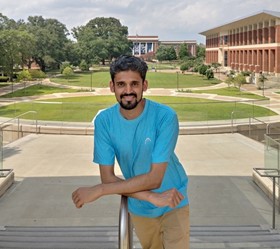 Pulin Agrawal, from India, is a passionate human-like intelligence researcher, a fan of the color
orange, and a guy who cherishes his extended and large family. His goal? To create
human-like intelligence in machines (he humorously notes that ChatGPT’s intelligence
is not quite human-like at all). Currently serving as an Assistant Professor of Computer
Science at The Behrend College at Pennsylvania State University, Pulin’s journey has
been nothing short of remarkable. Before his current role, he delved into cutting-edge
research at nFlux, where he contributed to the development of computer vision-based
technology aimed at supporting NASA astronauts on deep space exploration missions.
Pulin Agrawal, from India, is a passionate human-like intelligence researcher, a fan of the color
orange, and a guy who cherishes his extended and large family. His goal? To create
human-like intelligence in machines (he humorously notes that ChatGPT’s intelligence
is not quite human-like at all). Currently serving as an Assistant Professor of Computer
Science at The Behrend College at Pennsylvania State University, Pulin’s journey has
been nothing short of remarkable. Before his current role, he delved into cutting-edge
research at nFlux, where he contributed to the development of computer vision-based
technology aimed at supporting NASA astronauts on deep space exploration missions.
He graduated from the University of Memphis in 2013 with a Master’s in Applied Computer Science, specializing in Cognitive Science, and later earned his PhD in Computer Science in 2019. He seized every opportunity to grow and excel. Dive into his UofM Graduate School experience and discover the extraordinary journey that has shaped his path to success.
Bananas, a Theoretical Neuroscientist, and Becoming Co-Chair
One of my most memorable moments at the University of Memphis was working with the
best boss I ever had, MJ Garrett. As a Local Support Provider III for the College
of Arts & Sciences, she was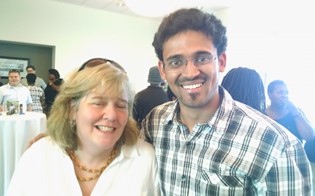 incredibly caring. She often brought us bananas most mornings because she knew we’d
get hungry by the end of our shift and needed to rush to classes right after. She
also made Christmas special by placing a Santa sock for each of us every year.
incredibly caring. She often brought us bananas most mornings because she knew we’d
get hungry by the end of our shift and needed to rush to classes right after. She
also made Christmas special by placing a Santa sock for each of us every year.
In addition, I had the privilege of meeting Dr. Walter Freeman III, a renowned theoretical neuroscientist known for his dynamical systems interpretation of a rat’s olfactory cortex.
Another unforgettable moment of personal achievement was when I received an email inviting me to be the co-chair of the International Conference on AGI in Shenzhen, China. This honor was particularly meaningful because my advisor, Dr. Stan Franklin, organized the first-ever AGI Conference at the University of Memphis in 2008. I was in the library when I saw the email. Unsure if it meant what I thought, I felt a surge of excitement and called my good friend and lab mate Sean right after leaving the library to share the news. Chairing the conference in Shenzhen and meeting Dr. Ben Goertzel, Chief Scientist of the Sophia robot, was a fantastic experience.
4 Professors to Spotlight
Several professors have profoundly impacted me throughout my academic journey at the
University of Memphis, shaping my academic and personal growth.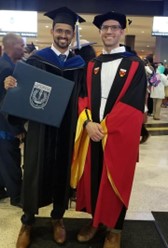
Dr. Bernie Daigle significantly contributed to my academic success with his compassion and support, both academically and personally. His calming smile and exceptional research skills enhanced my understanding of the scientific process, making my academic journey stress-free.
Dr. Charles Blaha was one of the most impactful teachers I encountered. He had a unique way of making concepts relatable and understandable, using any device available. His engaging and humorous teaching methods left a lasting impression, and I have immense respect for him.
Dr. Scott Fleming played a crucial role in my academic journey by transforming my reluctance toward his Software Engineering course into a deep appreciation for software development. His well-organized course and practical approach to projects made the learning experience real and engaging.
Dr. Stan Franklin was a compassionate mentor who guided me through my Master’s and Ph.D. degrees. His passion for research and genuine interest in people inspired me to be more like him.
UofM vs Carleton
After completing my undergraduate degree in Computer Science in India, I wanted to delve into studying the human brain to contribute to the development of human-like intelligence. Although I planned to pursue a PhD eventually, I felt I wasn't ready at that moment. Therefore, I began searching for master’s programs in Cognitive Science in the US and Canada. Carleton and the University of Memphis (UofM) were the only institutions offering suitable programs. I chose UofM after discovering that Dr. Stan Franklin, a world-renowned professor in Artificial General Intelligence, was part of the faculty. This confirmed my decision to pursue my graduate studies there. The Master's in Applied Computer Science with a specialization in Cognitive Science was unique, allowing me to explore the study of the human brain fully. The program's flexibility enabled me to take courses across various disciplines, including Psychology, Philosophy, Computer Science, Mathematics, and Engineering, wherever discussions about the human brain were held.
The Ability to do Research
As a tenure-track professor, research skills are crucial to my role. I developed these skills through exceptional guidance from my research advisors, Dr. Stan Franklin and Dr. Bernie Daigle. Additionally, the Cognitive Science Seminar at the Institute for Intelligent Systems, which featured researchers from both UofM and beyond, helped me cultivate a broader research mindset.
My teaching assistantship in the Department of Computer Science also significantly prepared me for my current position as a professor.
Lessons, Challenges, and Resources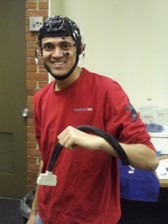
I learned the importance of using summer effectively for personal growth, making connections, and learning in new settings. I recommend students pursue internships or workshops off-campus during this time.
One piece of advice I'm working to incorporate is to manage multiple projects simultaneously, as it helps maintain momentum when one project stalls. Being a single-tasker, I find switching tasks challenging, but I recognize the value in having alternatives to focus on.
I recommend students to utilize the counseling center as it helped me in managing the stresses of my personal life while trying to complete my PhD.
Personal Development Opportunities
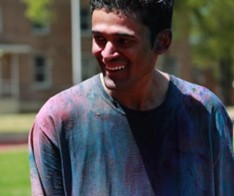 Through my graduate education, I gained valuable skills, qualities, and personal growth
experiences that have significantly contributed to my development.
Through my graduate education, I gained valuable skills, qualities, and personal growth
experiences that have significantly contributed to my development.
In my role as a Technical Support Graduate Assistant, I had the opportunity to assist numerous individuals with their technical issues, allowing me to interact with a diverse range of people. This experience was particularly beneficial for enhancing my communication skills, especially as I had recently relocated from India and was adapting to American language and culture. Additionally, serving as the President of the Indian Student Association provided me with valuable leadership and event management skills. Under Dr. Stan Franklin's guidance, I learned the importance of delivering clear and grammatically correct presentations, which significantly contributed to the development of my presentation skills.
